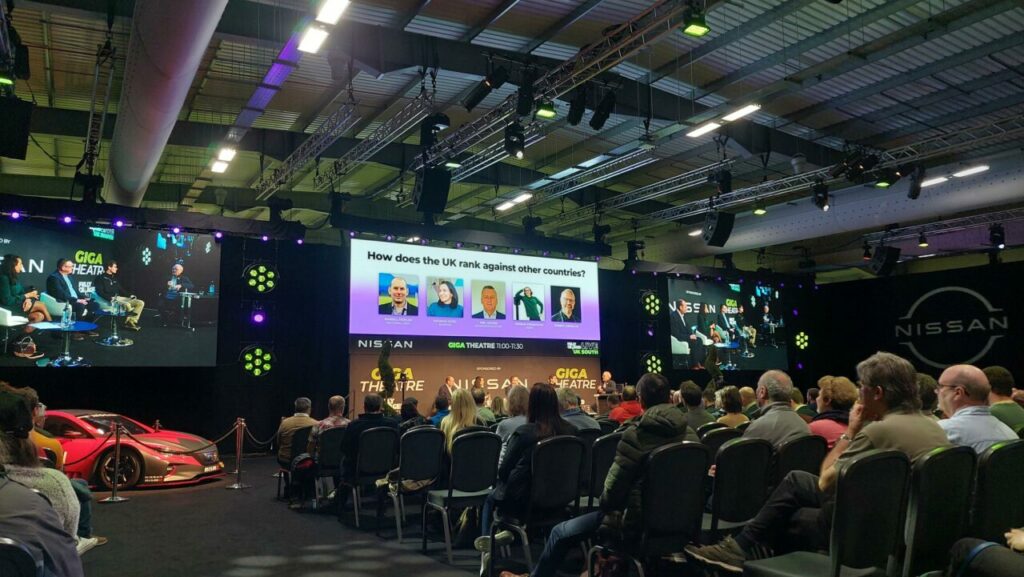The UK’s electric vehicle market (EV) has boomed over the last few years, as the number of EVs on UK roads surpassed one million in 2023.
But for the UK to continue to bolster its EV uptake it may need to start adopting a whole-system decarbonisation approach, following in the footsteps of other European countries.
Speaking on a panel at Fully Charged Live South 2023 today (28 April) Charlie O’Donoghue, head of product UK at Easee, referenced the co-functionality of Norwegian domestic systems.
“Norway loves electricity. For a long time, they didn’t even have dedicated chargers for EVs on the wall, they would plug the EVs in normally because [decarbonised heating and other technologies] meant that they didn’t have to worry.”
“The whole experience of having and electric as a focus is massively comforting, that’s what it’s all about. And then an electric car just becomes a car.”
For the UK to reach this mentality of ‘an electric car as just a car’, the panel discussed a number of potential changes and upgrades.
The great grid conundrum
As more people adopt EVs resulting in more chargepoint installation and inevitably a much great electricity intake, the issue of grid connection must be addressed.
Russell Fowler, senior project manager at the National Grid, said: “It is definitely something that we’re aware of. The system is set up to slowly bring generation on so if you want to move to renewables, we’ve got to double the size of the electricity grid by 2035.”
“The entire national grid took 100 years to build to today, and 15 years to double in size. So it is a huge challenge. There are issues in certain bits of the grid, I agree with that and hopefully some of the regulation changes that are coming on are speeding a resolution.
To tackle grids constraint, Fowler discussed a pre-emptive approach:
“If we know [increased grid connection requests] are going to come, let’s start from the top and middle and then when you come in, the grid’s already there.
“That’s a huge turnaround in how we do things and that’s where the challenge lies, So it’s generally really good to see change at the moment, but I acknowledge there is frustration.”
Earlier this month, the National Grid announced that it was undertaking a ‘Great Grid Upgrade’ to build a grid that can sustain a future generated by renewable energy.
The future of flexibility
In light of the success of the demand flexibility service (DFS) scheme, Fowler explained how this could be expanded in the future to deliver consumer savings and grid flexibility.
“We are going to need those kinds of programmes to scale up, because if you have a car contributing [to DFS] the load of the car versus a washing for example, that [energy savings] is where the real value is going to start to come in,” said Fowler.
“If you then you move them over into fleets, it benefits somebody as a fleet manager, as suddenly they’ve got a revenue stream coming in as well. So a totally different way to think about it. I think you will see things like [the DFS scheme] expanded in Great Britain.”
Natasha Patel, director at the business management consultancy, Baringa added: “We did some analysis and found that there was essentially £1000 of value per year for end users [parting in demand flexibility].”
Patel continued to say that this value was boosted to roughly £300,000 per year if demand flexibility were to be used for commercial vehicles for “not necessarily changing much of your actual behaviour and your patterns. Just simply doing letting somebody else manage that asset when you don’t need it.”
Upskilling the UK
Another important factor to enable the uptake of EVs is to ensure that the UK has the skills to develop and maintain them and their related technologies.
Fowler told the panel that National Grid estimated that 400,000 new green jobs (such as specialising in fixing EVs) were to hit the market.
“Those jobs don’t exist at the moment so we need to get people in and we need to re-skill them. If you’re midway through your career, it’s a great opportunity to learn how to fix an electric car,” concluded Fowler.
“It has got to be spread across the country as well, it is not going to be constrained in London or certain areas, they have to be spread across the country to be able to get a better result. So it’s a huge undertaking for businesses like us to get those people in to get those skills that need to go from schools to universities as it’s a great opportunity.”




